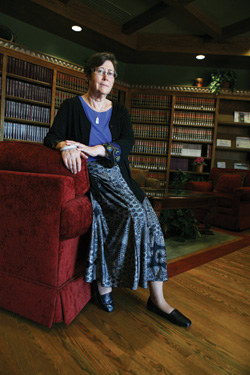Southwestern Law School professor and evidence expert Myrna Raeder dies

File photo of Myrna Raeder by Jonah Light.
Myrna S. Raeder, a longtime Southwestern Law School professor and ABA criminal justice section leader, has died.
Raeder, 66, died Saturday of breast cancer at her Los Angeles-area home, according to a news release posted Monday on the school’s website.
Raeder, who had taught at the school since 1979, was a nationally recognized expert on evidence and procedure. She was also a leading advocate for gender equity in the legal profession and the criminal justice system, and championed issues related to domestic violence and the impact of incarceration on women offenders and their children.
During her long academic career, Raeder, who also served stints as a prosecutor and a criminal defense lawyer, garnered national recognition for her scholarship and advocacy. In 2002, she received the Margaret Brent Women Lawyers of Achievement award, one of the ABA’s highest honors. Earlier this month, the ABA’s Criminal Justice Section, which she once chaired, awarded her its Charles R. English award for distinguished work in the field of criminal justice.
Raeder was too sick at the time to accept the award, which her son, Tom Kelly, who is also a lawyer, collected on her behalf. At the ceremony, Sheridan County, Wyo., County and Prosecuting Attorney Matt Redle, who headed the award selection committee, called Raeder a tireless advocate on behalf of victims of child abuse and the wrongly accused, for improving juvenile justice and supporting gender equity in the profession.
“In a career marked by service to the criminal justice community in ways literally too numerous to mention, Myrna is a shining example of the value of subordinating the parochial interests of prosecution and defense in favor of the broader interests of justice and fairness,” he said.
Redle said Thursday that the section and the ABA have lost a “dedicated member and a great, great friend.” He also said Raeder’s accomplishments with the ABA “speak volumes” about her as a person and a lawyer.
“Myrna’s was a life well spent,” he said. “It was so like Myrna to advocate for those causes dearest to her heart, even up to the very end.”
Southwestern dean Susan Prager said in a statement that Raeder had touched many lives, both within the law school and in the larger legal and academic community, “Without question, Myrna will be greatly missed, appreciated and remembered,” she said.
Barry A.J. Fisher, the retired director of the Los Angeles County Sheriff’s Department’s crime lab, called Raeder a “gracious woman who was passionate about justice.”
Fisher, who met Raeder nearly two decades ago when they both served on a National Institute of Justice committee, said they continued to meet regularly for lunch over the years and that he lectured frequently to her classes on forensic science.
But he said it was the lively discussions they had about how to improve forensic science for the benefit of the criminal justice system that will stick with him the most.
Case Western University law professor Paul Giannelli, who had known Raeder for at least 25 years, said she was devoted to legal reform and viewed her involvement in the ABA as the best way to achieve it.
He remembers her as a “top evidence scholar” and a “tireless worker” on many ABA projects, including the ABA’s Ad Hoc Innocence Committee to Ensure the Integrity of the Criminal Process, which they co-chaired.
The Criminal Justice Section is planning a memorial service for Raeder in January. Her family is requesting that donations be made in her memory to endow a scholarship in her name at the school.



